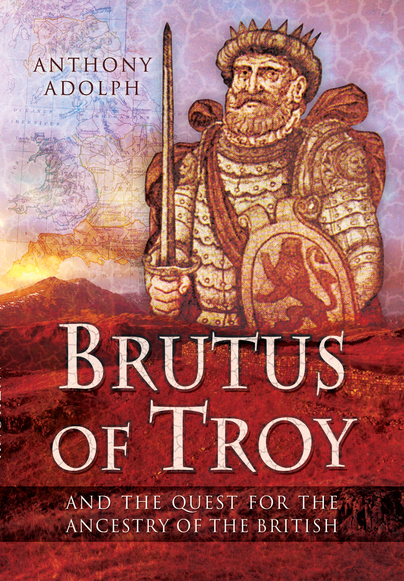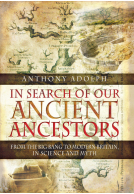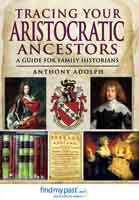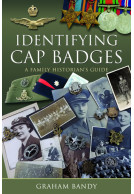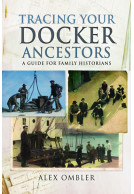Brutus of Troy (Hardback)
And the Quest for the Ancestry of the British
Imprint: Pen & Sword Family History
Pages: 237
Illustrations: 70 black and white illustrations
ISBN: 9781473849174
Published: 3rd November 2015
Review
'A unique exploration of the ancient foundations of being British' - Your Family History, March 2016, issue 166, p.89.
'Intricate, fascinating and densely written account of... a bedrock of [British] national identity and dreaming aspiration over 1,500 years' - Gillian Tindall review in History Today, October 2016
Watch Anthony Adolph's promotional film on YouTube! He explores Brutus's myth and his connection with some of London's most prominent landmarks, including St Paul's Cathedral and the Tower of London and shows his his myth has lived on in Gog and Magog, the giants who lead the Lord Mayor's Show to this very day.
(click here for international delivery rates)
Order within the next 5 hours, 45 minutes to get your order processed the next working day!
Need a currency converter? Check XE.com for live rates
| Other formats available | Price |
|---|---|
| Brutus of Troy Paperback Add to Basket | £15.99 |
| Brutus of Troy ePub (23.7 MB) Add to Basket | £6.99 |
Just who did the British think they were? For much of the last 1,500 years, when the British looked back to their origins they saw the looming mythological figure of Brutus of Troy. A great-great-grandson of the love goddess Aphrodite through her Trojan son Aeneas (the hero of Virgil's Aeneid), Brutus accidentally killed his father and was exiled to Greece. He liberated the descendants of the Trojans who lived there in slavery and led them on an epic voyage to Britain. Landing at Totnes in Devon, Brutus overthrew the giants who lived in Britain, laid the foundations of Oxford University and London and sired a long line of kings, including King Arthur and the ancestors of the present Royal Family.
Invented to give Britain a place in the overarching mythologies of the Classical world and the Bible, Brutus's story long underpinned the British identity and played a crucial role in royal propaganda and foreign policy. His story inspired generations of poets and playwrights, including Spenser, Shakespeare, Milton, Pope, Wordsworth, Dickens and Blake, whose hymn 'Jerusalem' was a direct response to the story of Brutus founding London as the New Troy in the west.
Leading genealogist Anthony Adolph traces Brutus's story from Roman times onwards, charting his immense popularity and subsequent fall from grace, along with his lasting legacy in fiction, pseudo-history and the arcane mythology surrounding some of London's best-known landmarks, in this groundbreaking biography of the mythological founder of Britain.
"The book is well-researched and illustrated, informative and interesting."
Norfolk Family History Society - 'The Ancestor' magazine
This book is an attempt to trace the "mytho-historical" roots of the British - and succeeds admirably. Nearly all of the present countries of Europe at one time or another have considered themselves to be an heir to the grandeur that was once the Roman Empire. In order to establish an "historical" and justifiable link to that Empire, they have created a genealogical path via various Trojan heroes who survived the Trojan War and landed on distant shores. The most well known is the noble Trojan Aeneas who was formulated as an ancestor of Romulus, the legendary founder of Rome, after the former landed in Italy. Ever since the termination of the Roman Empire, successor states have competed with each other as to which one was the rightful and legitimate heir. Rome was the model; Troy was the bloodline. Anthony Adolph, the author of Brutus of Troy, puts forth Britain's case. Packed with wide ranging information, many helpful illustrations, and nearly seven full pages of Bibliography and References, this is a most informative read.
Amazon Customer
Very enjoyable read that teaches anyone a great deal about how attitudes and identities evolved in Britain and Europe as people became literate and came out of the Dark Ages. Much of it's about analyzing the impact mythology had, and putting it clearly in context. Particularly enlightening regarding how different nations' peoples chose to identify themselves. I also learned a great deal about the great historians and poets of Britain and Europe that I never knew, and the genealogies of the Kings and Queens. Wonderful descriptions of the geography of Britain and where events were felt to have taken place. Two thumbs up!
Amazon Customer - Steven L. Harlan
Fantastic book. A must buy very well researched
Amazon Customer - Chris Farmer
Read the article here
Devon Live
Featured in
Clwyd Family History Society Hel Achau 148, March Issue
Ancient Origins
As featured in
Brixham News
As featured in
Totness Times
As featured in
South Devon & Plymouth Times
As well as a rattling good yarn, it is also the ancestor of modern archaeological and linguistic investigations. I am sure Adolph's book will be popular, not least because of what it shows us of the twists and turns of that centuries-old quest for origins.
Folklore Society
Anthony Adolph has served up an ingenious new assessment of the ancient Brutus saga. In Brutus of Troy and the Quest for the Ancestry of the British, Adolph excavates a quantity of British myth and archival information of the ancient figure of Brutus.
The Florida Bibliophile
Over 29 closely sourced chapters, with superb illustrations, including a possible timeline and family tree for his subject, Adolph advances an attractive case for Brutus as a foundational, though (finally) fictitious figure in British ancestry.
Of special interest, as Adolph shows, is the persistence of the Brutus myth in British literature as well as Royal propaganda and foreign policy.
Completely recasts the notion of 'ancient' ancestry by looking not at DNA, archaeology, or genealogical records, but at the history of an idea.
American Genealogist
This book, by exploring the literary history of the Brutus tradition, offers a lesson in how genealogy evolved as a literary form.
Intricate, fascinating and densely written account of... a bedrock of [British] national identity and dreaming aspiration over 1,500 years.
History Today, October 2016 - Gillian Tindall
Reviewed on Britain's Hidden History
Britain's Hidden History
As featured in.
Family Tree Magazine July 2016
Anthony Adolph is a leading professional genealogist, with a strong interest in tracing family ancestors back as far as possible. As explained in some of his other works, the ancients, having no written sources to refer to, sought to determine their own family history by drawing on oral information handed down through the generations, along with legends and mythological stories, which formed the basis of their research. One of the greatest examples of oral history which we know, is that of the Trojan War as told by Homer, with Aeneas, the Trojan hero, who led refugees away from the burning city of Troy and who subsequently became a Roman hero in Virgil’s Aeneid. This book seeks to link the history of the British nation with Brutus of Troy, who was the … great grandson of Aeneas… This is a fascinating and very enjoyable account of how our forefathers used the story of Brutus of Troy to link their ancestry to the narratives and legends of the past.
Genealogists’ Magazine, June 2016 - Barbara Jarvis
'Britain's history seen through its national myth'
The Telegraph Bookshop
In his latest research, renowned genealogist, Anthony Adolph, takes on the eponymous mythological ancestor of the British, Brutus. According to tradition, Brutus is a descendant of Aeneas, a Trojan refugee of the Trojan War (ca. 1200 BCE). It is through Brutus that the later English monarchs would lay claim to the throne; a tradition maintained by today’s Welsh Royalty.
Ancient Origins, Petros Koutoupis
Before this publication, I had no knowledge of “Brutus of Troy.” This came as a bit of a shock, mainly because his legacy has been so embedded into the history of England. Initially conceived by Medieval Age monks, Brutus was woven into the foundation myth of his people. And much like each culture before them, there was a constant desire to trace one’s lineage to something greater, typically resulting in an origin story. This is where Brutus comes into the picture.
The story of Brutus continues after Aeneas’s Virgilian journey from a burning Troy and to his eventual conquering of the Italian mainland. Ascanius, son of Aeneas, founded Alba Longa, a city in ancient Latium, Southeast of Rome. He married and fathered Brutus. As a young man, Brutus accidentally killed his father and was exiled from Italy. Much like his grandfather before him, Brutus sets off on a journey of his own, where the goddess Diana prophesied of his finding an island outside of the Pillars of Hercules (the Straits of Gibraltar) known as Albion (i.e. England). On his journey to the island and even after stepping foot on Albion, Brutus and his compatriots are met with a series of trials and tribulations, the next more devastating than the last. Brutus succeeded in all of his efforts and established a “New Troy.”
This would later become London. He divides the island amongst his offspring, thereby leaving his legacy and establishing the start of a Royal line.
Anthony Adolph introduces the reader to Brutus and the earliest traces of his story, as it was preserved in Medieval literature, and on the heels of Roman occupation and Roman influences. The reader is guided through each telling as it was told within its respective historical context. He then continues to provide a detailed account of Brutus’s life, as related by Geoffrey of Monmouth. This leads to each retelling of the hero’s tale and what and whom he would later inspire. As is fitting of every epic, Adolph ends his research with the traditions of Brutus’s passing and burial.
It is immediately apparent that Anthony Adolph has exhausted every resource at his disposal. The conclusion of which lead to an extremely well researched publication. I enjoyed reading this immensely. I would definitely recommend it to anyone with an interest in both Classical and Medieval literature.
This book will appeal to Modernist Deniers who will thank Anthony Adolph for hacking clear the brambles and nettles of mythology and fiction surrounding Britain’s Trojan origin story, while Residualists (‘There’s a residuum of truth in them thar tales!’) will likewise be grateful. Either way, the author’s clarificatory cultural survey is a service to historical scholarship. Yet Adolph has not solved the riddle of why some of the Britons opposing Julius Caesar’s invasions in the first century BC called themselves New Trojans (Trinovantes), nor has he come up with a convincing alternative to the name of Britain as deriving from ‘Land of Brit and his people’. What he has provided however is the first full biography of Brutus the Trojan, deftly written and richly illustrated to boot. The result is fascinating.
The National CV of Britain Group - Dr John Hart
An 'out of the ordinary' interesting book in which, amongst the 237 pages, you may find inspiration for your own family history research.
Essex Family Historian No.158
On his last book, In Search of Our Ancient Ancestors, Anthony Adolph gave us a long view of genealogy, exploring the pedigree of the human race, and the British in particular, since primeval times. This book is a sequel in a sense, but now moves away from what science and history have told us into more mythological territory, to explore what might be described as the ‘psychological ancestry’ of the British. Here the story begins with the legendary figure of Brutus, whom the 9th century chronicler Nennius claimed gave his name to our islands. His account, as with so much of our earliest ‘history’, was then much embellished by Geoffrey of Monmouth in the 12th century. The result is a fascinating account of how the British people have mythologised themselves as ‘New Trojans’ – although Brutus (whom nobody today claims as a historical figure) is himself generally forgotten today, his legacy is certainly with us, every time we sing Jerusalem or visit a place claimed to be linked to King Arthur. READ IT FOR: A unique exploration of the ancient foundations of being British.
Your Family History - March 2016
About Anthony Adolph
Anthony Adolph is a well-known professional genealogist with a particular interest in tracing family lines as far back as possible. He researched and co-presented Channel 4’s Extraordinary Ancestors, Radio 4’s Meet the Descendants and BBC 1’s Gene Detectives, has appeared on Heir Hunters and Who Do You Think You Are? and was a commentator for Sky and ITN News on the birth of his 10th cousin twice removed, Prince George of Cambridge. His books include In Search of our Ancient Ancestors: From the Big Bang to Modern Britain, in Science and Myth (Pen & Sword, 2015).







